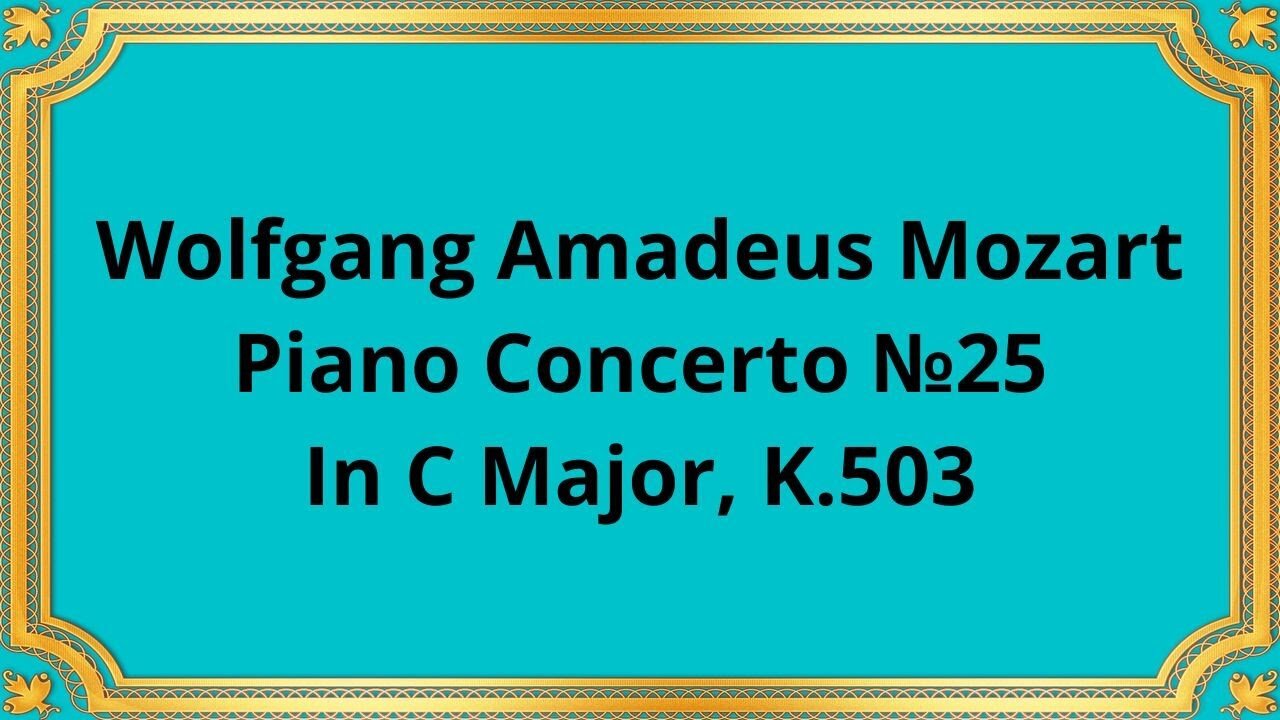Premium Only Content

Wolfgang Amadeus Mozart Piano Concerto №25 In C Major, K.503
#Mozart #ClassicalMusic #PianoConcerto #CMajor #K503 #MusicalComposition #MusicAppreciation #MusicHistory #Masterpiece #Composer
Publication date 1965
MICHELE BOEGNER, Piano SAAR RADIO CHAMBER ORCHESTRA, KARL RISTENPART, Conductor
Wolfgang Amadeus Mozart, an iconic figure in classical music, composed numerous masterpieces that continue to captivate audiences to this day. Among his extensive repertoire, the Piano Concerto No. 25 in C Major, K.503 stands as a testament to Mozart's exceptional talent and musical genius.
Composed in 1786, during the height of the Classical era, Piano Concerto No. 25 in C Major showcases Mozart's unparalleled compositional skill. This concerto was written during a prolific period in Mozart's career, where he pushed the boundaries of musical innovation and creativity. It represents a pinnacle of his artistic development, embodying the elegance, grace, and sophistication of the classical style.
Mozart's Piano Concerto No. 25 follows the traditional three-movement structure, consisting of an allegro, andante, and allegretto finale. The opening allegro movement immediately grabs the listener's attention with its vibrant and energetic melodies. The andante movement provides a poignant contrast, with its lyrical and introspective character. Finally, the concerto concludes with an exuberant allegretto movement, showcasing Mozart's mastery of creating lively and spirited musical dialogues.
One of the defining features of this concerto is Mozart's ability to craft memorable melodies filled with emotion and grace. The themes presented throughout the composition are melodically rich and harmonically sophisticated, reflecting Mozart's profound understanding of musical expression. The seamless integration of the solo piano and the accompanying orchestra creates a captivating sonic tapestry that delights the listener's ear.
Mozart's Piano Concerto No. 25 showcases his exceptional understanding of the piano as an instrument. The solo piano part is exquisitely written, displaying a wide range of technical brilliance and expressive possibilities. Mozart's command of the instrument is evident in the delicate passages, virtuosic flourishes, and moments of tender introspection. The interplay between the soloist and the orchestra creates a dynamic and captivating musical conversation.
Beyond the technical brilliance, Piano Concerto No. 25 delves into a realm of profound emotion and musical innovation. Mozart's ability to evoke a wide range of emotions, from joy and exuberance to introspection and melancholy, is unparalleled. Through intricate compositional techniques, Mozart weaves together contrasting themes and harmonies, creating a symphony of emotional depth that resonates with the listener's soul.
Conclusion:
Wolfgang Amadeus Mozart's Piano Concerto No. 25 in C Major, K.503 is a testament to his extraordinary musical genius. Its historical significance, melodic beauty, harmonic sophistication, expressive piano writing, and emotional depth make it a true masterpiece of classical music. This composition continues to enchant audiences, reminding us of Mozart's enduring legacy and his remarkable contribution to the world of music.
You have the opportunity to support the channel:
https://destream.net/live/RadSiarAl/donate
https://www.buymeacoffee.com/6355radsiaral
-

Ron DeSantis
3 hours agoGovernor Ron DeSantis Makes an Announcement in Orlando
12.8K1 -
 1:17:36
1:17:36
Graham Allen
4 hours agoDADDY’S HOME! Trump Lands Hamas Hostage Deal!! While Biden Tries To Take Credit! PATHETIC
57.3K52 -
 2:44:31
2:44:31
Matt Kohrs
10 hours agoBreaking Market News, Markets Breakout & Live Trading $1M || The MK Show
54K3 -
 35:50
35:50
BonginoReport
5 hours agoMy Dad's Senate Hearing - Kids, Chaos, and Everything! (Ep.120) - 01/16/2025
84.7K74 -
 LIVE
LIVE
Vigilant News Network
16 hours agoBUSTED: O’Keefe Exposes Secret Pentagon Plot to Sabotage Trump’s Return | The Daily Dose
999 watching -
 1:01:28
1:01:28
2 MIKES LIVE
13 hours agoTHE MIKE SCHWARTZ SHOW with DR. MICHAEL J SCHWARTZ 01-16-2025
13.4K5 -
 43:10
43:10
PMG
12 hours ago $1.16 earnedHannah Faulkner and Jeff Younger | Father fights for his son!
19.6K1 -
 1:24:14
1:24:14
Game On!
16 hours ago $6.27 earnedTaylor Swift SHOCKS Chief fans! Does NOT want Travis Kelce to retire!
49.4K14 -
 4:27
4:27
Reforge Gaming
15 hours agoTHIS will not save Ubisoft.
61.6K5 -
 7:35
7:35
Tactical Advisor
1 day agoNEW Springfield Prodigy Compact (FIRST LOOK)
94.5K7